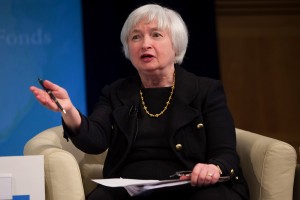
Have you ever heard of a pickle?
I don’t mean what you put on a hamburger. I’m talking about one of the funniest sequences in baseball—when a base runner gets a little too aggressive and finds himself caught between two bases, running hopelessly back and forth as the basemen trap him on the base path and eventually tag him out.
That’s a pickle. And boy, Federal Reserve Chair Janet Yellen is in one heck of a pickle.
Peter Morici wrote an interesting piece in the Washington Times last week where he speculated that the Federal Reserve may choose not to raise rates in June. He also questioned whether it would ever be prudent to do so.
Morici has a point. There are serious long-term consequences to raising the interest rate. There are also serious long-term consequences to keeping it where it is now.
If we raise the rate, economic activity might slow, resulting in lower tax revenue for cash-strapped states like Illinois and debt-ridden nations like Spain. Higher interest rates would effectively raise their relative debt burdens by increasing their interest payments, quite possibly to levels that they would be unable to pay.
So why not keep the interest rate near zero like the Federal Reserve has been doing for years?
Well, there are serious long-term consequences to that, too. As I’ve covered in the past, near-zero interest rates may have played a huge role in wage stagnation and the rising cost of living. The middle class has shrunk dramatically, and while a family of four might have been able to survive on one small income thirty years ago, the same family today would need at least two incomes to afford to maintain a decent lifestyle.
So Janet Yellen is in a pickle, and I don’t envy her position. We’ve reached an impasse where she has no good options to choose for our monetary policy—only less bad options.
So what’s the answer? How do we get out of this pickle?
To start, we can’t be afraid to talk monetary policy. Presidential candidates would be smart to put the issue of “good money” to the fore.
One proposal out there is to enact a Congressional Monetary Commission to take an objective look at how United States monetary policy has fared for Americans of all socioeconomic classes, analyze alternative monetary policy regimes, and recommend a long-term course of action. The commission would start an important dialogue.
So far, we’ve seen a few of the current GOP presidential candidates weigh in on the problem of stagnant wages and rising prices of core necessities. Now I’d love to see one or more of them publicly support the Monetary Commission and show that they’re serious about reigniting wage growth and equitable prosperity.
It’s not easy to get out of a pickle, but if we think outside of the box, maybe we can find a way to avoid being tagged “out.”
Jon Schweppe is Deputy Director of Communications for American Principles in Action.


